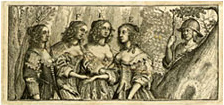White Kennett, Parochial Antiquities (1695)
Full Text
EEBO/TCP
Not available
Date
1695
Author
White Kennet (alternate name for White Kennett ) Note: 11/10/2005
Book title
Parochial antiquities attempted in the history of Ambrosden, Burcester, and other adjacent parts in the counties of Oxford and Bucks
Publication place
Oxford
Text type
printed book
Genre
Hard-word, term-of-art, and dialect dictionaries, glossaries, and definitions
Subject area
- agriculture
- antiquities
- law
- taxation
Summary
Includes "A Glossary to explain the original ... of words and phrases" (British Library shelfmark 10350.ee.26)
Language
headwords: Latin
explanations: English
other languages: Greek, Latin, Germanic, Icelandic, French, etc.
explanations: English
explanations: English
other languages: Greek, Latin, Germanic, Icelandic, French, etc.
explanations: English
Word-group
type: alphabetical
Word-entry
type: headword
number: 628
sample: ABUNDA. A mete or bound.--- Juxta ripam de Charwell usque ad metas & abundas ibidem per me concessas, p. 208. from Sax. banð a bond, from binðan to bind. Hence Hat-band, wrist-band, neck-band: to bound, to rebound: A Ban, an enclosed field or limited piece of ground. The Ban of a house or a mill, the close or back-yard adjoining to it. A Bandog, a Mastiff kept close, or tied up. A Bandore, or veil of a widow to bind over or cover her head and face. A Horse-Bin, which in Kent is that apartment of a stable, where the chaff and cut meat is secured by a partition of boards. A Bin or Bing, a Safe, an Aumbry or Cupboard in a Buttery or Larder. The kiln of the furnace wherein they burn their Charcoal for the melting of metals, is commonly call'd the Bing. And the Cistern, into which they throw their crystallized Allom for the water to drain from it, is call'd a Bing at Whitby in Yorkshire. A Bind of Eels, is a string or stick of Eels. A Binne of hides or skins, is in some Countries a quantity for common sale, consisting of thirty three skins or hides.
number: 628
sample: ABUNDA. A mete or bound.--- Juxta ripam de Charwell usque ad metas & abundas ibidem per me concessas, p. 208. from Sax. banð a bond, from binðan to bind. Hence Hat-band, wrist-band, neck-band: to bound, to rebound: A Ban, an enclosed field or limited piece of ground. The Ban of a house or a mill, the close or back-yard adjoining to it. A Bandog, a Mastiff kept close, or tied up. A Bandore, or veil of a widow to bind over or cover her head and face. A Horse-Bin, which in Kent is that apartment of a stable, where the chaff and cut meat is secured by a partition of boards. A Bin or Bing, a Safe, an Aumbry or Cupboard in a Buttery or Larder. The kiln of the furnace wherein they burn their Charcoal for the melting of metals, is commonly call'd the Bing. And the Cistern, into which they throw their crystallized Allom for the water to drain from it, is call'd a Bing at Whitby in Yorkshire. A Bind of Eels, is a string or stick of Eels. A Binne of hides or skins, is in some Countries a quantity for common sale, consisting of thirty three skins or hides.
Alston
III.i.498
Wing
K302
Criticisms
Ruano-García, Javier. "Looking for Regional Words in Late Seventeenth-century
England: Bishop White Kennett and his Glossary to Parochial
Antiquities (1695)." SEDERI 19 (2009): 151-73. view record




